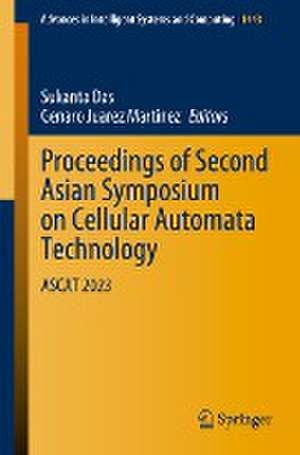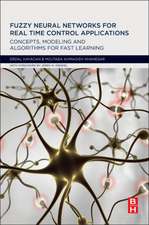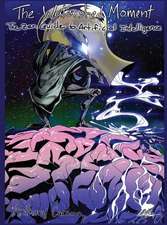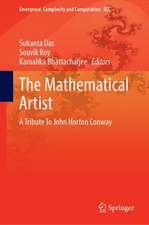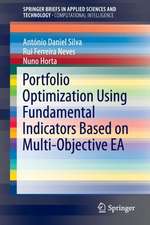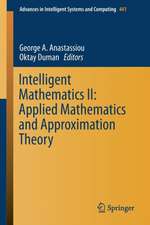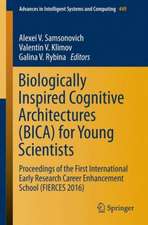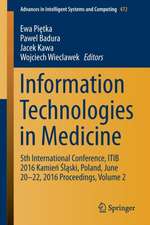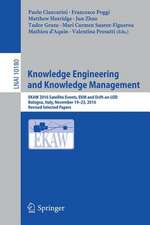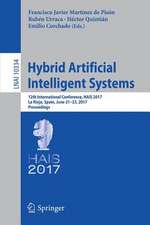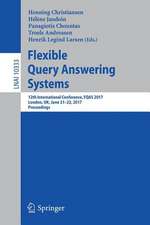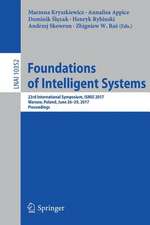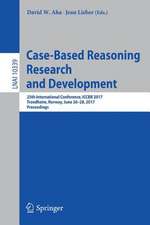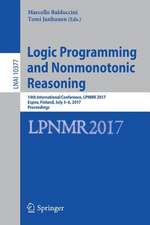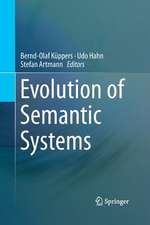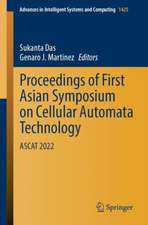Proceedings of Second Asian Symposium on Cellular Automata Technology: ASCAT 2023: Advances in Intelligent Systems and Computing, cartea 1443
Editat de Sukanta Das, Genaro Juarez Martinezen Limba Engleză Paperback – 14 mai 2023
Din seria Advances in Intelligent Systems and Computing
- 20%
 Preț: 1120.90 lei
Preț: 1120.90 lei - 20%
 Preț: 1090.59 lei
Preț: 1090.59 lei - 20%
 Preț: 1324.07 lei
Preț: 1324.07 lei - 20%
 Preț: 1989.79 lei
Preț: 1989.79 lei - 20%
 Preț: 1946.92 lei
Preț: 1946.92 lei - 18%
 Preț: 1273.28 lei
Preț: 1273.28 lei - 20%
 Preț: 2264.51 lei
Preț: 2264.51 lei - 20%
 Preț: 1337.27 lei
Preț: 1337.27 lei - 20%
 Preț: 1297.67 lei
Preț: 1297.67 lei - 20%
 Preț: 1315.82 lei
Preț: 1315.82 lei - 20%
 Preț: 1310.88 lei
Preț: 1310.88 lei - 20%
 Preț: 1302.62 lei
Preț: 1302.62 lei - 20%
 Preț: 882.20 lei
Preț: 882.20 lei - 20%
 Preț: 1305.93 lei
Preț: 1305.93 lei - 20%
 Preț: 1629.32 lei
Preț: 1629.32 lei - 20%
 Preț: 1345.49 lei
Preț: 1345.49 lei - 18%
 Preț: 1227.52 lei
Preț: 1227.52 lei - 18%
 Preț: 1290.64 lei
Preț: 1290.64 lei - 20%
 Preț: 1041.10 lei
Preț: 1041.10 lei - 20%
 Preț: 1034.52 lei
Preț: 1034.52 lei - 20%
 Preț: 1298.50 lei
Preț: 1298.50 lei - 20%
 Preț: 1330.67 lei
Preț: 1330.67 lei - 20%
 Preț: 1483.28 lei
Preț: 1483.28 lei - 20%
 Preț: 1971.64 lei
Preț: 1971.64 lei - 20%
 Preț: 1006.48 lei
Preț: 1006.48 lei - 20%
 Preț: 1471.75 lei
Preț: 1471.75 lei - 20%
 Preț: 1471.56 lei
Preț: 1471.56 lei - 20%
 Preț: 1454.40 lei
Preț: 1454.40 lei - 20%
 Preț: 1494.84 lei
Preț: 1494.84 lei - 20%
 Preț: 1269.64 lei
Preț: 1269.64 lei - 20%
 Preț: 1481.64 lei
Preț: 1481.64 lei - 20%
 Preț: 1192.08 lei
Preț: 1192.08 lei - 20%
 Preț: 1298.50 lei
Preț: 1298.50 lei - 20%
 Preț: 1489.07 lei
Preț: 1489.07 lei - 20%
 Preț: 825.78 lei
Preț: 825.78 lei - 20%
 Preț: 1649.93 lei
Preț: 1649.93 lei - 20%
 Preț: 1463.49 lei
Preț: 1463.49 lei - 20%
 Preț: 1438.77 lei
Preț: 1438.77 lei - 20%
 Preț: 1474.22 lei
Preț: 1474.22 lei - 20%
 Preț: 1298.50 lei
Preț: 1298.50 lei - 20%
 Preț: 1327.35 lei
Preț: 1327.35 lei - 20%
 Preț: 1973.31 lei
Preț: 1973.31 lei - 18%
 Preț: 947.04 lei
Preț: 947.04 lei - 18%
 Preț: 1441.39 lei
Preț: 1441.39 lei - 20%
 Preț: 638.55 lei
Preț: 638.55 lei - 20%
 Preț: 1320.76 lei
Preț: 1320.76 lei - 20%
 Preț: 1948.56 lei
Preț: 1948.56 lei
Preț: 1439.89 lei
Preț vechi: 1799.86 lei
-20% Nou
Puncte Express: 2160
Preț estimativ în valută:
275.52€ • 300.22$ • 232.17£
275.52€ • 300.22$ • 232.17£
Carte tipărită la comandă
Livrare economică 23 aprilie-07 mai
Preluare comenzi: 021 569.72.76
Specificații
ISBN-13: 9789819906871
ISBN-10: 9819906873
Pagini: 230
Ilustrații: XIV, 230 p. 100 illus., 65 illus. in color.
Dimensiuni: 155 x 235 mm
Greutate: 0.35 kg
Ediția:1st ed. 2023
Editura: Springer Nature Singapore
Colecția Springer
Seria Advances in Intelligent Systems and Computing
Locul publicării:Singapore, Singapore
ISBN-10: 9819906873
Pagini: 230
Ilustrații: XIV, 230 p. 100 illus., 65 illus. in color.
Dimensiuni: 155 x 235 mm
Greutate: 0.35 kg
Ediția:1st ed. 2023
Editura: Springer Nature Singapore
Colecția Springer
Seria Advances in Intelligent Systems and Computing
Locul publicării:Singapore, Singapore
Cuprins
Part I: Invited Papers.- 1. Modelling physical systems with cellular automata.- 2. On visualization of three-dimensional cellular automata and tilings with head-mounted display.- 3. Brownian Circuits: from Computation to Neural Networks.- Part II: Accepted Papers.- 4. A Cellular Automata Based Clustering Technique for High-Dimensional Data.- 5. Cellular Automata based Sentiment Analysis.- 6. Cellular Automata with Large Cycle Generator.- 7. Design and Analysis of Regular Clock based 2:4 Decoder using T-Gate in QCA.- 8. Representation of Evolution of One-dimensional Homogeneous Cellular Automata Using Monoid Action.- 9. A Cellular Automata Based Approach on Assessment of Thickness of Stratified Mineral Deposits.- 10. On Non-linear Maximal Length Cellular Automata.- 11. Layered Cellular Automata and Pattern Classification.- 12. Analysis of One-Dimensional 4-State Cellular Automata Rules and DNA Evolutions.- 13. Modeling Spread of Contagious Disease by Temporally Stochastic Cellular Automata.- 14. Genealogy Interceded Phenotypic Analysis (GIPA) of ECA Rules.- 15. Isomorphism in Cellular Automata.- 16. A cellular automaton model for language shift in Algeria.- 17. Cellular Automata based Simulation of Intergranular Fracture using Hexagonal Discretization.
Notă biografică
Prof. Sukanta Das currently works as an associate professor in the Department of Information Technology in Indian Institute of Engineering Science and Technology, Shibpur (formerly known as Bengal Engineering and Science University, Shibpur). He received his Ph.D. in 2007 from Bengal Engineering and Science University, Shibpur, and master’s in engineering in 2002 from Bengal Engineering College (DU) (currently known as IIEST, Shibpur) in Computer Science and Technology. He joined his alma mater as a faculty in 2003. He has been doing research in the different aspects of cellular automata for more than twenty years. His research area includes Cellular Automata: Theory and Applications. He is also a member of IFIP Working Group 1.5 (on “Cellular Automata and Discrete Complex Systems”) and several programming committees for international conferences on cellular automata. He has more than 70 articles under his name. Currently, he is exploring the computational abilities of cellular automata, non-uniformity in cellular automata, chaos and randomness in cellular automata, and democracy and computation. Apart from the research, Prof. Das plays also an active role of science activist to advocate against pseudoscience, astrology, and mysticism, and to promote scientific outlook in society.
Prof. Genaro Martínez is a full-time researcher at the National Polytechnic Institute in Mexico City. He is an active member of several institutions and laboratories around the world, such as the International Unconventional Computing Laboratory at the University of the West of England in the United Kingdom; the Foundation of Computer Science Laboratory at the Hiroshima University in Japan; the Centre for Chaos and Complex Networks at the City University of Hong Kong in China; the Unconventional Algorithms and Computing Lab at the Technical University of Ostrava in Czech Republic; the Laboratoire de Recherche Scientifique in France; and the Institut des Systèmes Complexes en Normandie in France. Prof. Martinez is an editorial member of the Journal of Cellular Automata, Complex Systems, Physica D, International Journal of Bifurcation and Chaos, Artificial Life, Nonlinear Dynamics, Chaos, Information Sciences, International Journal of Natural Computing Research, IEEE Transactions on Circuits and Systems, and the Mathematical Reviews, American Mathematical Society. Prof. Martinez together with Prof. Adamatzky had published the book "Designing Beauty: The Art of Cellular Automata". Also, he is leading two computational paradigms in cellular automata theory: colliders cellular automata and computation by competing patterns with cellular automata.
Prof. Genaro Martínez is a full-time researcher at the National Polytechnic Institute in Mexico City. He is an active member of several institutions and laboratories around the world, such as the International Unconventional Computing Laboratory at the University of the West of England in the United Kingdom; the Foundation of Computer Science Laboratory at the Hiroshima University in Japan; the Centre for Chaos and Complex Networks at the City University of Hong Kong in China; the Unconventional Algorithms and Computing Lab at the Technical University of Ostrava in Czech Republic; the Laboratoire de Recherche Scientifique in France; and the Institut des Systèmes Complexes en Normandie in France. Prof. Martinez is an editorial member of the Journal of Cellular Automata, Complex Systems, Physica D, International Journal of Bifurcation and Chaos, Artificial Life, Nonlinear Dynamics, Chaos, Information Sciences, International Journal of Natural Computing Research, IEEE Transactions on Circuits and Systems, and the Mathematical Reviews, American Mathematical Society. Prof. Martinez together with Prof. Adamatzky had published the book "Designing Beauty: The Art of Cellular Automata". Also, he is leading two computational paradigms in cellular automata theory: colliders cellular automata and computation by competing patterns with cellular automata.
Textul de pe ultima copertă
This book gathers selected research papers presented at the Second Asian Symposium on Cellular Automata Technology (ASCAT 2023), organized by academicians from Kolkata at Indian Institute of Engineering Science and Technology, Shibpur, West Bengal, India, and by researchers of Cellular Automata India, a research group which was created during the pandemic, during March 2–4, 2023. The book presents one of the most emergent areas in natural computing, cellular automaton (CA). CA is a paradigm of uniform fine-grained parallel computation which has been explored to understand complex systems by developing its model at the microscopic level. The book discusses many real-life problems in the domain of pattern recognition and classification, clustering, electronic circuit design, bioinformatics, material and mining engineering, modelling of physical and social systems, etc., by using CA.
Caracteristici
Presents research works in the field of cellular automata technology Provides original works presented at ASCAT 2023 held in Kolkata, India Serves as a reference for researchers and practitioners in academia and industry
